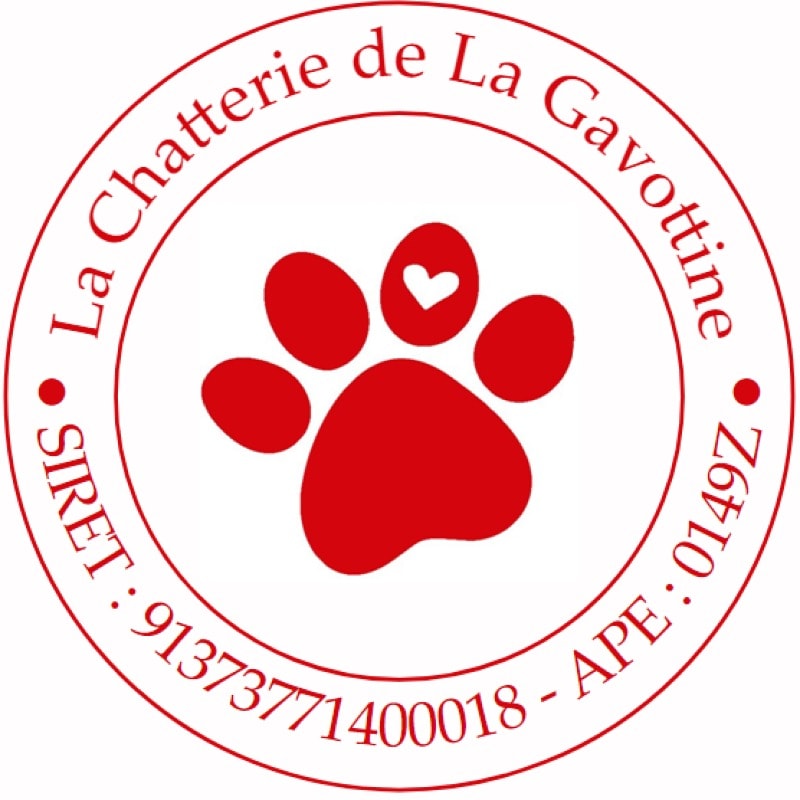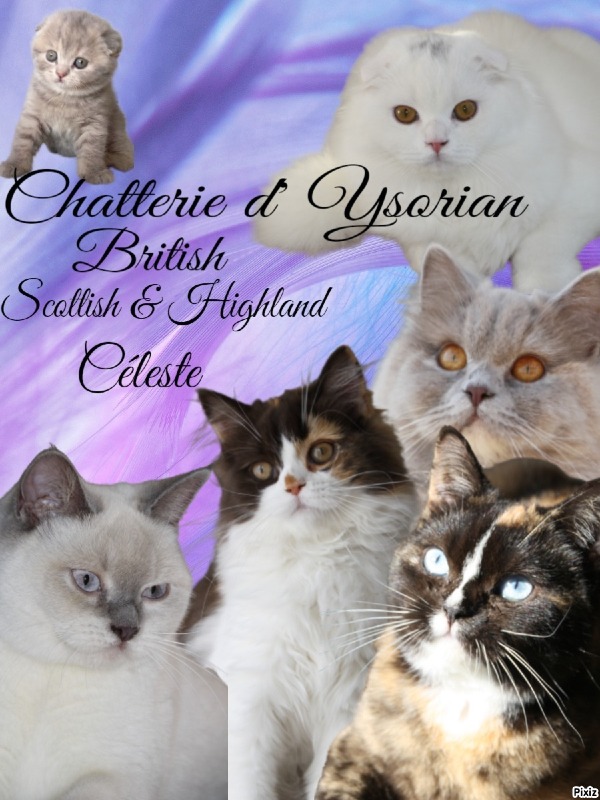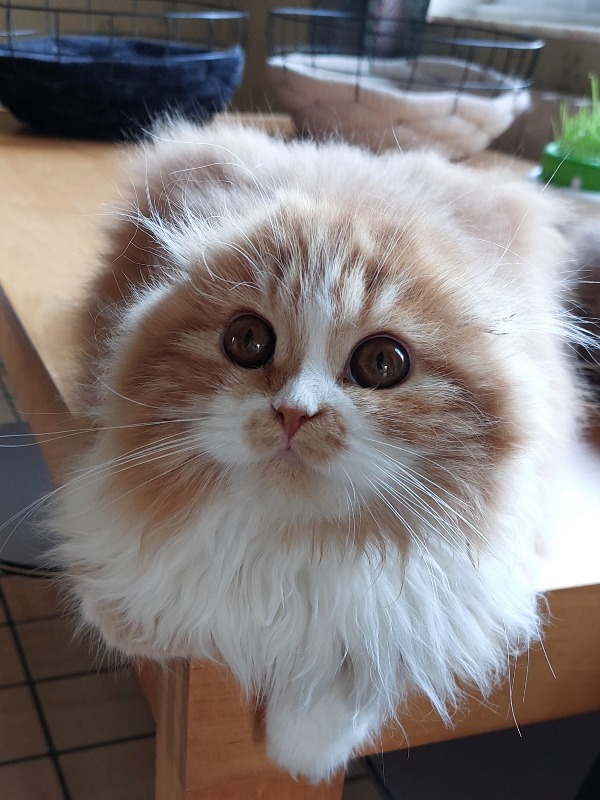Scottish fold
Autres noms : Scottish fold longhair, Fold longhair, Coupari
Discover the Scottish Fold, a cat breed known for its adorable folded ears and affectionate personality. These felines are playful, endearing, and calm, making them ideal companions for the whole family.
Awareness of acquiring an animal
Adoption and breeding of cats should always be guided by a sincere attachment to the animal and an understanding of its specific needs. Whether for leisure or passion, it is essential to provide a safe, enriching, and suitable environment. Avoid any impulsive acquisition that could harm their well-being. Cats require attention, regular healthcare, and a secure space. Commit to providing them with a quality life by being a conscientious and informed owner or breeder.
To learn more about animal welfare, we invite you to consult our FAQ by clicking the button below:
Origins and history
The Scottish Fold is a cat breed originating from Scotland, whose distinctive characteristics are mainly related to its folded ears. This trait was discovered in the 1960s when a farmer found a cat with folded ears named Suzy in a field. Suzy was then bred with domestic cats. This experiment resulted in a lineage carrying the genetic mutation responsible for the unique ear shape.
In the 1970s, breeders began to develop the breed. The first Scottish Folds were often crossed with British Shorthairs to enhance their robustness and ensure genetic diversity. Their popularity quickly grew, particularly due to their charming appearance and gentle, sociable temperament.
However, the mutation responsible for the folded ears can also lead to health issues, including bone deformities. For this reason, cautious breeders now focus on ethical breeding, crossing Scottish Folds with other breeds to prevent complications. Today, this breed is celebrated for its affectionate nature and distinctive appearance, while being closely monitored by breeding professionals.
Physical characteristics
The Scottish Fold is a cat breed easily recognizable due to its distinctive physical characteristics. The most striking element of its appearance is undoubtedly its forward-folded ears, which give it a unique and endearing look. These ears result from a genetic mutation that affects the cartilage, creating a particular appearance that adds to its charm.
In terms of size, the Scottish Fold is typically medium to large, with a robust and muscular body. Its coat can be short or long, and it comes in a variety of colors and patterns, including solid, tabby, or spotted. The texture of its fur is soft and dense, providing a luxurious appearance.
The face of the Scottish Fold is round with full cheeks, and its nose is short and well-proportioned. Its large, round eyes can be of various shades, often harmonizing with the color of its coat. This combination of features gives it a gentle and endearing expression that leaves no one indifferent. Thus, the Scottish Fold is a breed that combines a unique appearance with a loving and sociable personality.
Character
The Scottish Fold is a fascinating breed of cat, recognized for its unique appearance and distinct personality traits. Firstly, these felines are characterized by their affectionate nature. They easily bond with their owners and often seek their company. This sociability makes them ideal companions for families and individuals living alone.
In addition to their gentle temperament, Scottish Folds are often described as curious and playful cats. They enjoy exploring their environment and engaging in playful activities. This makes them particularly well-suited for homes with children, as they appreciate interactions and playtime. However, they are also capable of being independent and can spend time alone without too much difficulty.
Finally, Scottish Folds exhibit a calm and composed behavior. Although they are playful, they are not hyperactive. This helps create a serene environment conducive to relaxation. Their balance of liveliness and tranquility makes them sought-after pets for those who desire a soothing presence in the home. In summary, this breed combines affection, curiosity, and serenity, providing an enriching experience for any owner.
Life expectancy
The life expectancy of Scottish Fold cats generally ranges from 12 to 15 years. However, some individuals can live longer with proper care and a good diet. As with many breeds, life expectancy can be influenced by various factors, including environment, veterinary care, and genetics.
This breed is famous for its folded ears, which give it a distinctive appearance. However, this physical characteristic is linked to a specific gene that can also lead to health problems. Cats carrying the folded ear gene are prone to developing joint disorders, particularly a disease affecting the joints, which can impact their quality of life. Paying particular attention to signs of discomfort or joint pain is essential to ensure their well-being.
Scottish Fold cat owners should therefore be aware of their general health, including regular veterinary visits for routine check-ups. Good hygiene and a balanced diet are also crucial factors in promoting optimal longevity. In summary, although the life expectancy of this breed is reasonable, it is vital to provide them with a healthy environment and regular medical care to maximize their years of life.
Exercise and activity needs
The Scottish Fold is a cat breed that is distinguished by its folded ears and gentle personality. Regarding its exercise and activity needs, it is essential to provide a stimulating environment for this breed. Scottish Folds benefit from regular physical activity to maintain their health and optimal weight. Due to their calm and affectionate temperament, these cats enjoy interactive play that allows them to expend energy while strengthening their bonds with their human companions.
Games such as balls, feather wands, or scratching toys are particularly suitable. They not only help satisfy their natural hunting instincts but also prevent boredom, which can lead to undesirable behaviors. Additionally, Scottish Folds enjoy playtime with their owners, further enhancing their sociability.
It is also crucial to incorporate moments of exploration into their daily routine. Providing cat trees or climbing walls can encourage exercise while offering a retreat space for emotional well-being. With a mixed approach of interactive play and suitable installations, these cats can lead a balanced and fulfilling life.
Recommended diet
The diet of Scottish Folds must be carefully balanced to meet their specific nutritional needs. Due to their genetic predisposition to certain health conditions, an appropriate diet is crucial. These cats require food that is high in quality protein from animal sources. This will help maintain their muscle mass and support their energy levels.
It is also essential to include healthy fats in their diet, which promote healthy skin and coat. Omega-3 and Omega-6 fatty acids are particularly beneficial. Furthermore, Scottish Folds can be prone to obesity if their diet is not controlled, so it is important to monitor portion sizes and avoid excesses.
Hydration is another critical factor. Providing fresh water at all times is vital, as is considering the inclusion of wet food, which can also help prevent urinary problems. Finally, regular consultations with a veterinarian are recommended to adjust their diet according to their age, activity level, and overall health condition. This will help ensure a long and healthy life for these cherished companions.
Training and obedience
The education and training of Scottish Fold cats require a gentle and respectful approach to their temperament. This breed is known for its affectionate and sociable nature, which often makes it easier to learn the basics. Start by establishing a trusting relationship with your cat by offering affection, interactive play, and cuddle time. Creating a reassuring environment is essential for their well-being.
In terms of training, it is helpful to use positive methods, such as rewarding desired behaviors with treats or praise. This not only helps to learn simple commands but also strengthens the bond between the owner and the animal. Avoid punishments, as they can lead to anxiety and harm trust.
Finally, Scottish Folds are generally curious. Take advantage of this curiosity to introduce them to brain games. This will stimulate their minds and contribute to their development while making learning fun and enjoyable.
Behavior with children
Scottish Fold cats are known for their sweet and affable personality, making them ideal companions for families with children. Their calm and sociable temperament allows them to easily adapt to a lively environment. They tend to be playful and curious, which makes them interactive and engaging for young children. These cats enjoy playing, which can strengthen the bonds between them and the children through fun activities.
However, it is essential to teach children how to interact respectfully with these animals. While generally tolerant, Scottish Folds need space and moments of tranquility. It is crucial to educate children on how to gently handle and play with the cat to avoid any stress. By learning to recognize signs of fatigue or discomfort in the cat, children also develop their empathy and responsibility toward animals.
Finally, it is important to note that these cats tend to form strong bonds with their humans. Their affectionate nature can lead to a mutual trust relationship, allowing children to feel safe and loved. By providing a calm and respectful environment, Scottish Folds can thrive in a family setting, making them loving and loyal companions.
Compatibility with Other Animals
The Scottish Fold cat breed is generally known for its gentle and friendly nature, making them good companions for other pets. Their calm temperament allows them to easily adapt to an environment where other animals coexist, whether they are dogs, other cats, or even rodents. However, as with any animal, early socialization is essential to establish positive relationships with other species.
Scottish Folds are often described as curious and playful. This dynamic can play a crucial role in their interactions with other animals. Their playful nature makes them likely to want to engage in play, which may not always be well received by an older dog or a less sociable animal. It is therefore recommended to monitor initial encounters and interact proactively to ensure a smooth adaptation.
Furthermore, the social hierarchy among pets must be taken into account. A Scottish Fold, being generally non-dominant, may sometimes find itself in a subordinate position, especially in the presence of a more assertive dog. Overall, this breed thrives in a diverse household, provided that introductions are made with care and that each animal is given adequate space and resources to avoid conflicts.
Grooming needs
The Scottish Fold is a cat breed that has specific grooming and maintenance needs. Due to their dense and plush coat, these cats require regular brushing to avoid knots and tangles. Weekly brushing is usually sufficient, but during shedding season, it may be necessary to increase the frequency to remove dead hair and reduce the amount of fur lost in the home.
Regarding hygiene, it is essential to regularly check and clean these cats' ears, as their head shape can make them more prone to wax buildup. Their claws should also be maintained; regular trimming is recommended to prevent tearing or injuries. Additionally, to help maintain good dental health, focusing on oral hygiene with appropriate solutions, such as dental treats or regular tooth brushing, is advisable.
Finally, providing a clean and safe environment is crucial. Regular cleaning of the litter box and living spaces contributes to their overall well-being. By addressing these grooming and maintenance needs, you will ensure the health and happiness of your four-legged companion.
Health
The health of Scottish Folds is a significant concern due to the genetic peculiarities that influence their appearance. This breed is famous for its folded ears, which result from a genetic mutation. However, this mutation is associated with potential health issues, including joint disorders. Scottish Folds may be predisposed to osteochondrodysplasia, a condition that affects the development of cartilage and bones, leading to pain and reduced mobility.
Another aspect to watch for is heart health. Some studies indicate that the breed may suffer from hypertrophic cardiomyopathy, a disease that thickens the heart muscle and can lead to serious problems if left untreated. It is essential to have regular check-ups with a veterinarian to detect any issues early on.
Finally, as with any breed, diet and weight should be monitored to prevent obesity, which can exacerbate other health conditions. An active lifestyle and a balanced diet contribute to the longevity and overall well-being of Scottish Folds. In summary, proactive attention and frequent veterinary visits are crucial for maintaining the health of this unique breed.
Environment and habitat
The Scottish Fold is a breed of cat known for its folded ears and affectionate nature. In terms of environment, these cats adapt well to different types of housing, whether in an apartment or a house. They require a safe and stimulating space where they can play, climb, and explore. It is essential to provide interactive toys and cat trees to satisfy their curiosity and need for exercise.
Regarding habitat, the ambient temperature should be comfortable, ideally between 20 and 25 degrees Celsius. These cats enjoy warmth and avoid drafts. A calm and serene environment is recommended, as these animals are sensitive to loud noises and sudden changes in their routine.
Finally, the Scottish Fold can easily coexist with other pets and children, making it a popular choice for families. A social and loving environment promotes their emotional and physical well-being, ensuring a fulfilling life.
Name ideas
Choosing a name for a Scottish Fold cat is an important step, as it often reflects the animal's personality, appearance, or the affection you have for it. To make a good choice, you should consider several criteria: simplicity, originality, and sound. A good name should be easy to pronounce and remember, both for you and for the cat.
Scottish Folds often have a sweet and affectionate character, so a name that evokes these traits can be a good idea. Think also about the unique appearance of these cats, especially their folded ears, which can inspire fun or creative name choices. Moreover, it can be interesting to select names that carry a certain meaning or tell a story.
Here are some suggestions for your Scottish Fold cat's name: Moka, Clover, Biscuit, Olive, Nimbus, Truffle, Pixel, Zephyr, Pompom, Sienna, Ibis, Nimbo, Pearl, Pudding, and Trixie. These names are both charming and easy to pronounce, while also reflecting the playful and gentle personality of this breed. Take the time to observe your cat to find the name that suits it best.
Average purchase price
The price of Scottish Fold cats can vary significantly based on several factors. In general, the cost of a kitten from a reputable breeder often ranges between 1,500 and 2,500 euros. This price can be influenced by the quality of the lineage, which may include championships won by the parents, as well as the care provided to the animals by the breeder.
Breeders who focus on the health and genetics of their animals tend to charge higher prices because they invest in health testing and maintain a healthy living environment for the cats. Breeders offering kittens with special traits or rare colors may also increase their prices.
It is also worth noting that the initial costs are only part of the expenses associated with cat ownership. Expenses for food, veterinary care, vaccinations, and necessary accessories should also be taken into account. Thus, prospective owners should be prepared to allocate a long-term budget to ensure the well-being of their pet.
Expenses
Owning a Scottish Fold cat involves certain costs that are important to consider. On average, the monthly expenses associated with caring for this animal can vary, but it is reasonable to budget around 50 to 100 euros per month.
Food expenses make up a significant portion of this budget. It is recommended to provide high-quality food to ensure the animal's health. Depending on the brands and types of food chosen, costs can range from 30 to 60 euros per month. Veterinary care, including vaccinations and regular check-ups, also represents a major expense. These costs can be estimated at about 10 to 20 euros per month on average throughout the year, taking into account a spreading of expenses for unforeseen care.
Finally, additional costs such as hygiene products (litter, brushes, etc.) as well as accessories (toys, scratching posts) can add an extra 10 to 20 euros per month. In summary, owning an animal of this breed requires a regular financial commitment to ensure its well-being and health.
Destination and usage
The Scottish Fold is a breed of cat particularly valued as a pet due to its sociable and affectionate temperament. These cats are known for their distinctive fold, which gives them a unique and endearing appearance. Their looks, combined with their gentle personality, make them very popular among families and individuals looking for a loyal companion.
Scottish Folds adapt well to various types of households, whether with children or other animals. Their sociable nature generally makes them friendly and curious, promoting pleasant interactions with all family members. They require attention and affection, and they enjoy playtime, making them ideal companions for active households.
Aside from their friendliness, this breed is also appreciated for its intelligence. They can be trained to use interactive toys and puzzles, stimulating their minds and strengthening the bond with their owners. In summary, choosing a Scottish Fold as a pet means opting for a loyal, loving, and intelligent companion capable of bringing warmth and joy to a home.
Legislation and regulation
The Scottish Fold cat breed is unique due to the genetic mutation that causes the folding of the ears. This particularity raises various ethical and regulatory concerns in several countries. In some regions, the breeding of these animals for their distinctive feature is deemed problematic due to associated health issues. Observing cases of arthritis and other anomalies, animal welfare organizations advocate for a ban on their breeding.
In the UK and Europe, strict regulations govern breeding practices to ensure animal welfare. Expert committees review breeding practices and recommend rigorous health standards. In countries like the United States, laws are less stringent, but social pressure for animal welfare often encourages breeders to adopt responsible practices.
Elsewhere in the world, some countries have imposed restrictions or even bans on breeding this breed, concerned about preventing any animal suffering. Owners and breeders are increasingly urged to prioritize the health and well-being of animals over aesthetic considerations.
Official recognition
The Scottish Fold cat breed is officially recognized in several countries, reflecting its growing appeal among breeders and feline enthusiasts. Originating in the United States in the 1960s, this breed is easily identifiable by its forward-folded ears, giving it a unique and endearing appearance.
In countries like France and the United Kingdom, feline clubs have recognized this breed and established specific standards regarding physical and behavioral characteristics. Breeders must comply with these standards for their cats to participate in shows. Cat organizations are also concerned with health issues, particularly those related to the genetic mutation responsible for the ear fold, in order to ensure the well-being of the cats.
However, in some countries, the recognition of this breed is more controversial due to ethical concerns regarding the consequences of selecting physical traits. Some European countries, for example, have adopted strict regulations on breeding to avoid health problems associated with genetic mutations. This debate continues to evolve, influencing international recognition and breeding practices surrounding this fascinating breed.
Pedigrees
To obtain a pedigree for Scottish Fold cats, it is essential to contact reference clubs and registries dedicated to the promotion and preservation of this breed. In Europe, one of the main organizations is the International Cat Federation (FIFe). This registry promotes strict standards in selection and breeding, thus ensuring the authenticity and genetic quality of the cats.
Another major player is the Cat Fanciers' Association (CFA), based in the United States. The CFA is renowned for its commitment to feline breeds and maintains a registry of Scottish Folds as well as essential criteria for their breeding. By registering with these organizations, breeders can obtain official pedigrees that certify the lineage of their animals.
In addition to these organizations, there are many other national and international specialty clubs that can also issue pedigrees for Scottish Folds. Therefore, prospective owners or breeders are encouraged to consult the official websites of these associations to ensure they comply with the required standards and health criteria for the breed. This not only guarantees traceability but also ensures the quality of the Scottish Fold cat that one wishes to acquire.
Prohibitions
The Scottish Fold is a breed of cat recognized for its folded ears, giving it a unique appearance. However, this characteristic is the result of a genetic mutation that can lead to health problems in these animals. Many countries and regions have become aware of the issues related to the breeding of this breed.
In the United Kingdom, ethical concerns have led some breeders and animal welfare organizations to recommend avoiding crossbreeding that promotes the ear mutation. As a result, discussions have taken place about the need to regulate or even ban this practice.
In other countries, such as the United States, laws are less strict, but veterinarians warn about the risks of genetic diseases, such as osteoarthritis. This has led some breeders to better inform prospective owners about the health risks associated with this breed.
Finally, in Europe, regulations have been proposed to limit the breeding of breeds that present health issues induced by their morphology, which could ultimately affect this breed. Debates continue, oscillating between passion for this breed and ethical concerns regarding its welfare.
Breeders of Scottish fold
Want to see more breeders of Scottish fold?
Check out the page of our directory listing all breeders of Scottish foldClassified Ads of scottish fold
No of scottish fold classified ads are available on Preeders.
If you’re a breeder, sign up for free now and be the first to post a classified ad
Breed clubs of scottish fold
No of scottish fold breed clubs are currently registered on Preeders.
If you would like to highlight your breed club, sign up for free now and be the first to appear on this page.







